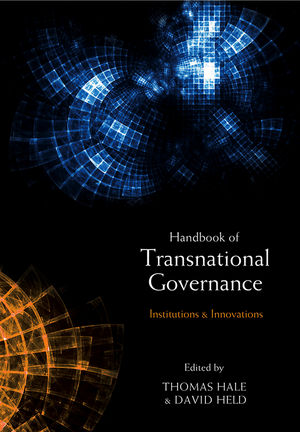The Handbook of Transnational Governance: Institutions and InnovationsISBN: 978-0-7456-5061-6
Paperback
296 pages
July 2011, Polity
 |
||||||
Central European Journal of International and Security Studies
"This new handbook could not be more timely. For teachers and students of international governance, diplomats and policy-makers, foreign policy gurus and political scientists - and dare one suggest, elected politicians - it is a book that should be seen as an indispensable reference to understanding the challenges ahead and the context in which they work, and it will give them an insight into the nature of the multipolar world of which they must attempt to make sense."
Journal of Contemporary European Studies
"Essential for those who want to explain why transborder governance has changed and to understand what implications these changes have for global politics. Never has such a broad sample of institutional innovations been gathered together, and such an empirical baseline is needed for sound theorizing of the causes and effects of innovations in transnational governance."
Sir ReadaLot
"A comprehensive starting-point for understanding the complex
array of organizations, associations, and networks engaged in
contemporary transnational governance. It shows us much about what
we know and don't know - particularly about the impact of these
novel arrangements. This volume can help to set the agenda for a
new generation of scholarship on the politics of complex
interdependence."
Robert O. Keohane, Princeton University
"The configuration of a multipolar world without the tools to
fuel transnational efficiency and legitimacy is highly risky. This
brilliant and comprehensive volume enriches previous research on
the transformations of governance in the international community
and it is essential for those seeking to understand the challenges
ahead and their impact on world politics."
Javier Solana, President of ESADE Center for Global Economy and
Geopolitics, former EU High Representative for the Common Foreign
and Security Policy
"An indispensable reference for anyone interested in global
cooperation and problem-solving in the 21st century. By documenting
multiple forms of transnational governance, from transgovernmental
networks to multi-stakeholder coalitions to voluntary codes of
conduct, the book describes a growing global infrastructure of
regulation and enforcement. The authors also include arbitral
bodies, which undergird a public-private system of law enforcement
that is familiar to lawyers but is all too often left out by
political scientists. I can't imagine anyone teaching or writing
about this subject without consulting this book."
Anne-Marie Slaughter, Princeton University, former Director of
Policy Planning, US State Department



